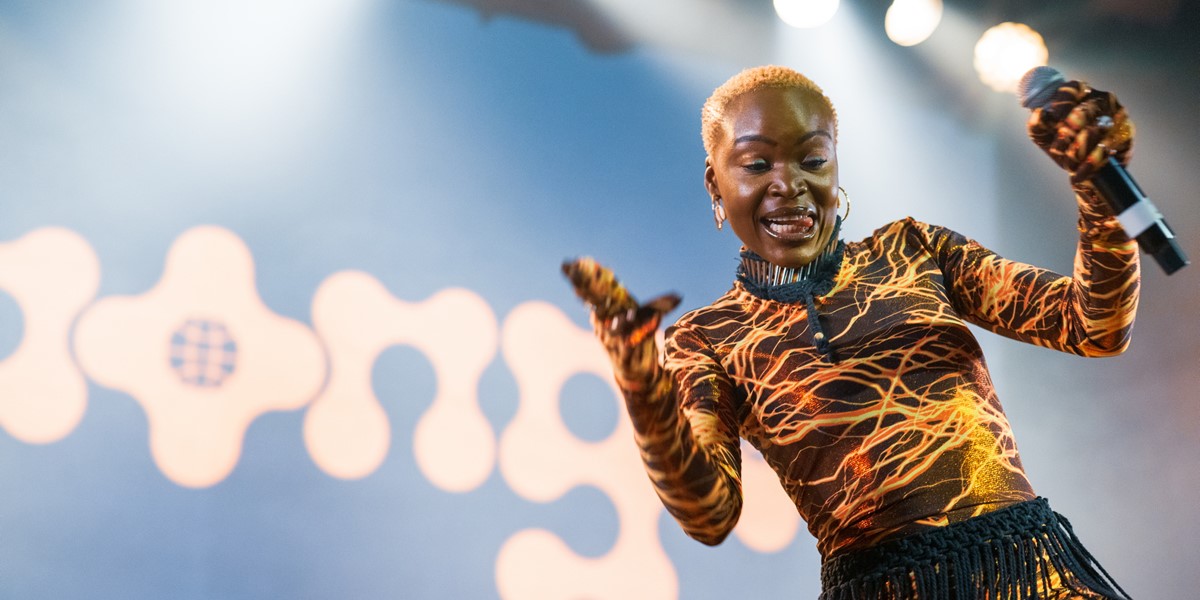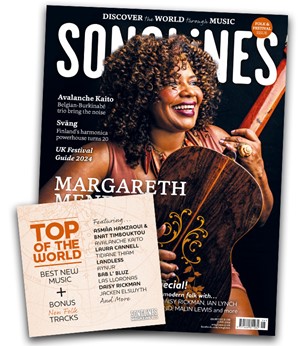Thursday, July 20, 2023
Victory Dance: Interview with Pongo
From war-torn Angola to the ‘northern lights’ of Trømso World Festival, Pongo tells Jane Cornwell, “I have come a very long way”

© Lars Opstad
It’s the opening night of the inaugural Tromsø World Festival in northern Norway, the gateway to the Arctic Circle. The air is crisp enough to see your breath. There is snow on the mountains flanking the harbour and, in a serendipitous display, the night sky is strafed with silver and green.
The festival’s main venue, the Studentsamfunnet Driv, is heaving, steamy. The coat racks are groaning under layers of puffer jackets and fake fur. A cheer goes up when festival CEO Vasil Gjuroski strides onstage to begin proceedings; the colourful ex-Yugoslavian is a popular figure in small town Tromsø, and his vision for a global music celebration – enabled in collaboration with Oslo World’s new five-city-wide Movement Network – has finally, fabulously, come true.
The act that christens Tromsø World isn’t from Norway, although she has just played Oslo World two years in a row. The compact green-haired woman who bursts into view – jumping, high-kicking, singing up a frenzy – is from Angola, and she’s a rising superstar. Get used to her name: Pongo.
“Tromsøøø,” she trills, flanked by a drummer, a DJ and two female dancers wearing shorts as short as her own. She launches into her irrepressible 2018 hit ‘Tambulaya’, a song that tells of dance floor encounters and joyful distractions that took place during and in spite of Angola’s civil war, her thin, strong voice soaring over a high-octane crossover of electronic beats and styles, including hip-hop, Afrofunk and the rhythms of Portuguese-speaking Africa.
‘Dance, dance, dance,’ sings Pongo in a mix of Portuguese and Kimbundu, her first language. ‘Lift the skirt, break the rules, let loose.’
‘Tambulaya’ means ‘to give and to take’ in Kimbundu, a notion that suits her big-hearted sound and its grab-bag of genres. The song’s video sees her decked out in fatigues and a military beret, delivering her message through a megaphone, inviting listeners onto a dancefloor that brings healing, release and collective might. The same joyful, personal-is-political aesthetic pervades her 2022 debut album Sakidila (Thank You) – which includes the bangers ‘Wegue Wegue’ and ‘Bruxos’, and the lusher, softer love song ‘Doudou’ – and her entire life. “A lot of the expression in my work comes from my childhood memories,” says Lisbon-based Pongo, 31, who left strife-torn Angola at the age of eight. “I have faced many problems and all these things have made me stronger. I fought very hard for my freedom, for my rights as a Black woman, a woman and a human, and I am winning.”
Pongo’s verve, like her music, is powerful, infectious. After twerking alongside her dancers, she plunges into the Tromsø crowd, encouraging them to dance around her, in a way that resembles the dança de roda (circle dance) of semba music, that off-the-beat predecessor to Angolan styles including kizomba and kuduro. For a moment the diva is out of sight, surrounded by a whirl of dancing bodies. Then, just as suddenly, she’s back onstage. Rapping, singing, karate kicking the air.
“We did these circle dances at family parties and ceremonial events when I was growing up,” she says. “I like to have these moments in my shows to share the energy. I need to get the audience involved.”
It’s been some journey for the woman born Engracia Domingos da Silva in Luanda, Angola, to an ex-street dancer turned construction worker and a mother who worked as a maid. “My earliest memories are musical,” says Pongo, the eldest of five daughters. “I remember dancing to semba, and soukous from Congo, and loving the music of [Angolan singer/composer] David Zé. I remember being five or six and being taken to see [Angolan folk and semba legend] Bonga in concert, wanting to be up there on the stage, dancing with his crew. I don’t remember much about the war,” she adds, referencing the decades-long Angolan conflict that flared again in the late 90s, “just that we had to leave.”
After a year in Rome – in a space so cramped she shared a bed with her sisters – the family were relocated to the outskirts of Lisbon. Racism was rife: “You didn’t see many African people in Portugal then. At school I wanted to share my culture, but there was so much discrimination. I was taunted by the other kids, even by teachers. It happened on the street, buses, everywhere.”
Homelife, too, was fraught. When her father’s authoritarianism became unbearable, 12-year-old Pongo threw herself from their seventh-floor apartment window, sustaining near-fatal injuries. “I am not ready to talk about my father and his behaviour because I am respecting the other people involved,” she says. “But I started saying no to him. I fought to make change for my mum and sisters.”
It was her father, nonetheless, who nicknamed her Pongo after Congolese singer M’Pongo Love (who’d been unable to walk after polio treatment). Her long rehabilitation (she’d broken a leg) involved catching the train to physiotherapy sessions; she’d arrive early to watch kuduro group Denon Squad perform on the platform. “I was always there, so shy, dreaming of joining in. One day they called on me to show them a dance move,” she says. “I reached deep inside myself and danced, and they invited me to join the group. I was so happy. Later they brought me into the studio to sing because their vocalist was away. It was really only for fun. I was a dancer, not a singer.”
“Somehow a tape made its way to Buraka Som Sistema” – an electro-kuduro group signed to Sony BMG – “who wanted me to sing with them too. I was 15,” Pongo shrugs. “So I went and recorded my song ‘Kalemba (Wegue Wegue)’, which talks about my father’s street dancing competitions, and the street I grew up on in Luanda. Then they took me on a big tour of Portugal. I had to learn fast.”
Loosely translated as Storm (Victory), peppered with references to semba, baobab trees and makumba (sorcery) ‘Kalemba (Wegue Wegue)’ was a monster hit that featured on soundtracks for video games including Need for Speed and FIFA 10. But Pongo received no royalties. “By then my father had left and I was carrying a lot of responsibility. I thought I was helping my family financially but I was naive. After two years I left. It was not a good first experience with the industry.”
Several years of menial jobs followed. Pongo was working as a cleaner when she heard ‘Kalemba (Wegue Wegue)’ on the radio and – a lightning bolt realisation – understood that she could re-enter the biz on her own terms. And her timing was right. Technological advances and an influx of sounds from postcolonial Angola, Guinea, Cape Verde and Mozambique were transforming the Lisbon music scene.
Her 2018 EP Baia, with its hints of Caribbean zouk and Brazilian samba, marked her out as an artist taking kuduro in new directions. Her second coming began. In 2019 she played the Fête de la Musique in Paris before French president Emmanuel Macron and his wife Brigitte (“I felt equality in this moment; he told me she dances to kuduro”). 2020’s Uwa broadened her fanbase and consolidated her themes. “In my songs I have diversity, liberty, freedom. I believe in positivity.”
And in keeping negative energy at bay. In 2021 Pongo’s coiled, joyful COLORSxSTUDIOS performance of ‘Bruxos’ (Witches) drew so many YouTube hits it got her onto Spotify’s EQUAL Global playlist. Her image duly featured on a billboard in New York’s Times Square.
‘Bruxos’ with its chattering ‘digui digui digui’ refrain and bold self-references (‘Pongo on beat, annihilates without fear,’ she declaims in Portuguese), was a stand-out of Pongo’s Oslo World 2021 concert, the catalyst for ecstatic fans to jump onstage and dance. It was a high point that clinched Pongo’s repeat invite, and brought her to Tromsø, the furthest north she’s ever been. “Pongo has the X Factor,” says Oslo World’s Alexandra Archetti Stølen. “We loved her so much we decided to create a tour for her in Norway and, as expected, from Bergen to Tromsø the response was amazing. She works very hard. She runs in the morning. She is a mother. She loves playing live and brings the same power to a small venue that she does a 10,000 strong arena. People go crazy for her.”
Pongo tours intensively, appearing always in a flamboyant and ever-changing array of outfits, hair colours and nail designs. She has form at Glastonbury, across Europe and in Canada. She’ll tour the UK again in June, and in July she’s at WOMAD. Tromsø, she tells me, was life affirming. “Walking outside at night and seeing these lights in the sky, this aurora borealis, was a very spiritual experience that touched me deeply.”
Pongo flashes a smile. “I have come a very long way.”
Pongo will play this year's WOMAD (July 27-30)
This article originally appeared in the July 2023 issue of Songlines magazine. Never miss an issue – subscribe to Songlines today

